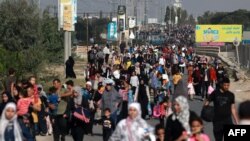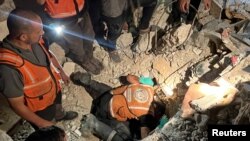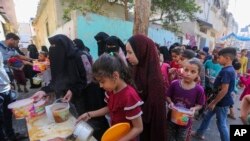Gaza City, the Hamas militant group's main stronghold in the territory, is encircled by Israeli forces. The military said troops have advanced to the heart of the densely-populated city while Hamas says its fighters have inflicted heavy losses.
The Israeli military statement said two separate strikes eliminated a leading Hamas armorer, Mahsein Abu Zina, and fighters engaged in anti-tank or ground-to-ground rocket fire. Palestinian media also reported clashes between militants and Israeli forces near al-Shati (Beach) refugee camp in Gaza City.
Reuters was unable to verify the battlefield claims of
either side.
Israel has pounded Gaza from the air and used ground troops to divide the narrow coastal strip in two, following the Hamas raid on southern Israel on Oct. 7, when gunmen killed 1,400 people and took some 240 hostages.
The Israeli bombardment has killed more than 10,000 Palestinians, around 40% of them children, over the past month, according to counts by health officials in Hamas-ruled Gaza. Israel says 32 of its soldiers have been killed.
Defence Minister Yoav Gallant said Israel had "one target - Hamas terrorists in Gaza, their infrastructure, their commanders, bunkers, communications rooms."
Chief military spokesperson Rear Admiral Daniel Hagari said combat engineers were using explosive devices to destroy a tunnel network built by Hamas that stretches for hundreds of kilometers beneath Gaza.
Israeli tanks have encountered heavy resistance from Hamas fighters using the tunnels to launch ambushes, according to sources with Hamas and the separate Islamic Jihad militant group.
ISRAEL SEEKS 'INDEFINITE PERIOD' OF CONTROL
Israelis have voiced fear that military operations could further endanger hostages, who are believed to be held in the tunnels. Israel says it won't agree to a ceasefire until the hostages are released. Hamas says it won't stop fighting while Gaza is under attack.
"I challenge (Israel) if it has been able, to this moment, to record any military achievement on the ground other than killing civilians," senior Hamas official Ghazi Hamad told Al Jazeera television.
"Gaza is unbreakable and will remain a thorn in the throat of the Americans and the Zionists," Hamad said. Washington has backed Israel's position that a ceasefire would help Hamas militarily. But U.S. President Joe Biden said on Tuesday he had urged Prime Minister Benjamin Netanyahu to undertake a pause in fighting for humanitarian reasons.
Nearly two-thirds of Gaza's 2.3 million residents are internally displaced, according to U.N. figures, with thousands seeking refuge at hospitals including in makeshift canvas shelters in their car parks.
Israel has so far been vague about its long-term plans if it achieves its stated goal of vanquishing Hamas. In some of thefirst direct comments on the subject, Netanyahu said Israel would seek to have security responsibility for Gaza "for an indefinite period" after the war.
But officials said Israel is not interested in governing the enclave. Gallant, the Israeli defence minister, said that after the war was finished, neither Israel nor Hamas would rule Gaza.
SAUDI CONVENES SUMMITS
Saudi Arabia will host summits of Arab and Islamic nations in coming days to discuss the Israeli-Palestinian conflict, the kingdom's investment minister said on Wednesday. Iranian President Ebrahim Raisi will travel to Saudi Arabia on Sunday for the Organisation of Islamic Cooperation summit, Etemadonline news reported, the first visit by an Iranian head of state since Tehran and Riyadh ended years of hostility under a deal brokered by China in March.
"The objective of bringing these...summits and other gatherings under the leadership of Saudi Arabia would be to drive towards peaceful resolution of the conflict," Saudi investment minister Khalid Al-Falih said at the Bloomberg New Economy Forum in Singapore.
'NO FOOD, NO WATER'
At Gaza City's Al Shifa hospital, Um Haitham Hejela, a woman sheltering with young children in an improvised tent fashioned from fabric, said they fled their home because of air strikes.
"The situation is getting worse day after day," she said. "There is no food, no water. When my son goes to pick up water, he queues for three or four hours in the line. They struck bakeries, we don't have bread."
The U.N. says Gaza's health system is close to collapse, battered by airstrikes, flooded with trauma patients, and running out ot medicines and fuel. Saudi owned al-Hadath TV reported that the Indonesian hospital in Gaza had lost power.
There are 350,000 patients with chronic conditions in Gaza, including cancer and diabetes, as well as 50,000 pregnant women, according to data from United Nations organizations, and many are no longer receiving treatment.
"The longer we wait, the worse some patients will get. Many people will die merely because they have no access to treatment," said Osama Qadoumi, the supervisor at Makassed Hospital.














Forum